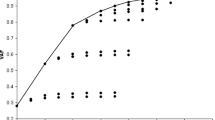Abstract
DEDICOM is a method for decomposing an asymmetric data matrix with relationships among a set of objects into a loading matrix and a matrix of relationships between “underlying” aspects. In Kiers and Takane’s constrained DEDICOM the loading matrix can be constrained to have, for instance, zeros at prespecified positions. In particular, one can constrain the loading matrix such that it has only one nonzero element per stimulus, thus assigning the objects into (prespecified) simple components. Simple components here refer to components to which mutually exclusive subsets of objects are assigned. Thus, this procedure entails a partitioning of the objects into mutually exclusive clusters. In practice, it is often hard to choose the partitioning a priori. The present paper offers a procedure for finding a partitioning on the basis of the data. Specifically, in the present paper a method is proposed which partitions the objects into nonoverlapping clusters yielding the best possible fit of DESICOM (DEDICOM employing Simple components). The paper offers algorithms for finding the best simple components both on the basis of full data tables, and on the basis of data where the diagonal is to be ignored. Some technical results on the performance of the algorithms are given, and the method is illustrated by means of the analysis of two empirical data sets.
Similar content being viewed by others
References
Abramowitz, M. & Stegun, I.A. (1964). Handbook of Mathematical Functions. New York: Dover.
Chino, N. (1990). A generalized inner product model for the analysis of asymmetry. Behavior-metrika, 27, 25–46.
Chino, N. & Shiraiwa, K. (1993). Geometrical strutures of some non-distance models for asymmetric MDS, Behaviormetrika, 20, 35–47.
Gower, J.C. (1977). The analysis of asymmetry and orthogonality. In J.R. Barra, F. Brodeau, G. Romier, & B. van Cutsem (Eds.), Recent developments in statistics (pp. 109–123). Amsterdam: North-Holland Publishing Company.
Harshman, R.A. (1978). Models for analysis of asymmetrical relationships among N objects or stimuli. Paper presented at the First Joint Meeting of the Psychometric Society and the Society for Mathematical Psychology, Hamilton, Ontario, August
Harshman, R.A., Green, P.E., Wind, Y., & Lundy, M.E, (1982). A model for the analysis of asymmetric data in marketing research, Marketing Science, 1, 205–242.
Kiers, H.A.L. & Takane, Y. (1993). Constrained DEDICOM. Psychometrika, 58, 339–355.
Kiers, H.A.L. & Takane, Y. (1994). A Generalization of GIPSCAL for the Analysis of Non-symmetric Data. Journal of Classification, 11, 79–99.
Okada, A. & Imaizumi, T. (1987). Nonmetric multidimensional scaling of asymmetric proximities. Behaviormetrika, 21, 81–96.
Penrose, R. (1956). On best approximate solutions of linear matrix equations. Proceedings of the Cambridge Philosophical Society, 52, 17–19.
Sato, M. & Sato, Y. (1994). Structural model of similarity for fuzzy clustering. Journal of the Japanese Society for Computational Statistics. 7, 27–46.
Ten Berge, J.M.F. & Kiers, H.A.L. (1989). Fitting the off-diagonal DEDICOM model in the least-squares sense by a generalization of the Harman & Jones MINRES procedure of factor analysis. Psychometrika, 54, 333–337.
Author information
Authors and Affiliations
About this article
Cite this article
Kiers, H.A.L. Desicom: Decomposition of Asymmetric Relationships Data into Simple Components. Behaviormetrika 24, 203–217 (1997). https://doi.org/10.2333/bhmk.24.203
Received:
Revised:
Published:
Issue Date:
DOI: https://doi.org/10.2333/bhmk.24.203




